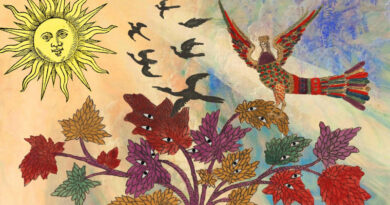Review: Milkweed ‘Folklore 1979’
It doesn’t happen very often, but just occasionally, I find myself listening to a piece of music and thinking ‘WHAT IS THIS???’. Of course, usually I know the name of the track and the artist but what I need to know is what hook to hang it on, especially if the music, or the artist, seems to draw influences from divers (sic) sources.

Now, there are obvious and common convergences in style, myriad portmanteaus of nomenclature that bands use to try to let would-be listeners know where they’re coming from. A quick glance at the tags accompanying your favourite act’s Bandcamp page will throw up all manner of doom/sludge/drone/death/noise/stoner conglomerates, and on the EDM side of things… well, let’s not go there right now. But this, this… thing that is Milkweed’s Folklore 1979 required repeated listens in order to get to grips with it.
The trad folk site calls this anonymous duo ‘slacker-trad’ – a useful hint for the uninitiated folk neophyte, for this is deeply and wondrously lo-fi. But straight-up folk, it definitely ain’t. First off let’s consider the artistic conceit behind Milkweed’s canon. Each of their albums is based on a literary source – the lyrics for this one being taken from a forty-five-year-old copy of the Folklore Society journal of the same name.
Previous releases have done similar – 2022s Myths And Legends Of Wales draws inspiration from a book of the same name, 2023s The Mound People is based on an anthropological text about preserved bronze age bodies. And herein lies another strand of the curious tale of Milkweed; there’s a distinctly unsettling, folk horror-esque vibe to the whole piece. Even the cut-up documentary soundtrack that is The Legend of the Pacing White Mustang, accompanied by squiggly, wailing Central Asian (?) wind instruments manages to disturb whilst seemingly containing nothing sinister.
Part of the mechanism causing uneasiness is the ‘found’ nature of the whole album. It feels as though it was put together through countless overdubbing on an old Phillips tape recorder, probably on a previously used and erased (badly) cassette. It doesn’t sound made for public consumption with sound dropping in and out, harsh beginnings and endings, things that sound like clips of whatever else used to be on the tape. Or maybe it’s a tape recording of a kid with a short attention span scanning through medium wave radio stations?
Give Folklore 1979 eleven and a half minutes of your life, give yourself up to Milkweed’s wyrd magic, and never be the same again…
One of my first impressions was that the tracks with breakbeats reminded me of DJ Shadow’s early work. While that was a useful jumping-off point when beginning this listening odyssey, it does no justice in trying to enlighten others as to the weird and creepy pleasure contained within this truncated eleven-minute album.
Licking off with My Father’s Sheep Is Dead sets the tone – lyrically and musically – for this anti-bucolic trip. Beginning with snatches of noise (see above for deets) before a beat kicks in accompanying G’s hypnotic vocal. This breaks down into a different beat before finding resolution in the original melody. All in two minutes and forty-nine seconds, phew!
The Snake In Chinese Belief and The Tree As A Kinship Symbol have similar breakbeat feels (folk hop anyone?) whilst the dark tale of Mordred, King Arthur’s Son has a much more traditional feel to it with vocal accompanied only by drum and giving light to G’s incredible scansion and phrasing, which makes seemingly impossible lyrics fit so naturally as to be seemingly born for their lines.
This is such a short album, yet it feels of the perfect length for this work. Somehow, Milkweed have managed to infuse so much magic into eleven minutes that time seems to stretch in the best possible way, and a song lasting a mere ninety-five seconds can consume the listener wholly and transport them to a much more eerie and interesting place. And not just once.
I have listened to Folklore 1979 more than any other album this year (I bought the tape on preorder – gotta have the artefacts!) and it rewards repeated listening with deeper insights and wider travels. I could talk about the impressive multi-instrumentalism on display here, or the mind-altering creativity at play, but these are mere pieces of a much more magical, threatening, entertaining whole. Give Folklore 1979 eleven and a half minutes of your life, give yourself up to Milkweed’s wyrd magic, and never be the same again.
Label: Broadside Hacks
Band Links: Bandcamp | Spotify | Instagram
Scribed by: George Green



